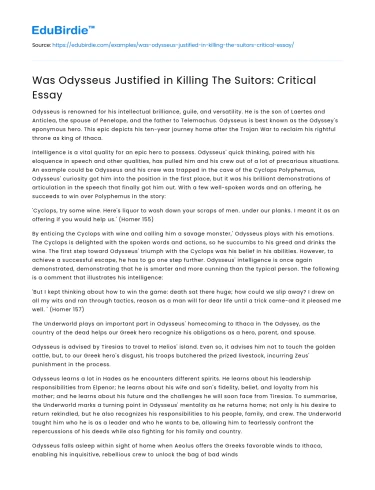Odysseus is renowned for his intellectual brilliance, guile, and versatility. He is the son of Laertes and Anticlea, the spouse of Penelope, and the father to Telemachus. Odysseus is best known as the Odyssey's eponymous hero. This epic depicts his ten-year journey home after the Trojan War to reclaim his rightful throne as king of Ithaca.
Intelligence is a vital quality for an epic hero to possess. Odysseus' quick thinking, paired with his eloquence in speech and other qualities, has pulled him and his crew out of a lot of precarious situations. An example could be Odysseus and his crew was trapped in the cave of the Cyclops Polyphemus, Odysseus' curiosity got him into the position in the first place, but it was his brilliant demonstrations of articulation in the speech that finally got him out. With a few well-spoken words and an offering, he succeeds to win over Polyphemus in the story:
Save your time!
We can take care of your essay
- Proper editing and formatting
- Free revision, title page, and bibliography
- Flexible prices and money-back guarantee
'Cyclops, try some wine. Here's liquor to wash down your scraps of men. under our planks. I meant it as an offering if you would help us.' (Homer 155)
By enticing the Cyclops with wine and calling him a savage monster,' Odysseus plays with his emotions. The Cyclops is delighted with the spoken words and actions, so he succumbs to his greed and drinks the wine. The first step toward Odysseus' triumph with the Cyclops was his belief in his abilities. However, to achieve a successful escape, he has to go one step further. Odysseus' intelligence is once again demonstrated, demonstrating that he is smarter and more cunning than the typical person. The following is a comment that illustrates his intelligence:
'But I kept thinking about how to win the game: death sat there huge; how could we slip away? I drew on all my wits and ran through tactics, reason as a man will for dear life until a trick came-and it pleased me well. ' (Homer 157)
The Underworld plays an important part in Odysseus' homecoming to Ithaca in The Odyssey, as the country of the dead helps our Greek hero recognize his obligations as a hero, parent, and spouse.
Odysseus is advised by Tiresias to travel to Helios' island. Even so, it advises him not to touch the golden cattle, but, to our Greek hero's disgust, his troops butchered the prized livestock, incurring Zeus' punishment in the process.
Odysseus learns a lot in Hades as he encounters different spirits. He learns about his leadership responsibilities from Elpenor; he learns about his wife and son's fidelity, belief, and loyalty from his mother; and he learns about his future and the challenges he will soon face from Tiresias. To summarise, the Underworld marks a turning point in Odysseus' mentality as he returns home; not only is his desire to return rekindled, but he also recognizes his responsibilities to his people, family, and crew. The Underworld taught him who he is as a leader and who he wants to be, allowing him to fearlessly confront the repercussions of his deeds while also fighting for his family and country.
Odysseus falls asleep within sight of home when Aeolus offers the Greeks favorable winds to Ithaca, enabling his inquisitive, rebellious crew to unlock the bag of bad winds and unleash a tempest that throws them off course. When Odysseus falls asleep on the island of the sun god Helios, his soldiers defy strict orders and feast on the sacred cows. Because his evolution as a character is not easy or absolute, the obstacles Odysseus confronts make his progress more authentic and genuine.
An epic hero is also recognized for his desire to achieve glory via his actions. Odysseus describes himself as 'formidable for guile in peace and war' in the first few words of The Odyssey. Odysseus' wit not only delivers peace but also brings about and initiates battles. When Odysseus eventually displays his actual nature to the suitors after disguising himself as a beggar, it is an example of his deceit-producing conflict. As Homer puts it,
Even though all the mistreatment by the suitors, Odysseus waits patiently, even when Antinous hurls a stool at him, he does not react and continues to walk away. Odysseus' patience paid off, and he was able to exact vengeance on the suitors. He mingled with the suitors because of his cunningness and his plan to work. He made sure there were no weapons so that the suitors could not attack him and made sure all doors were locked from the outside so no one could escape. He waited till the appropriate moment came to start the slaughter. Odysseus' guile provokes havoc and upheaval, but his wisdom also delivers harmony.
'You yellow dogs, you thought I'd never make it home from the land of Try. You took my house to plunder and twisted my maids to serve your beds. You dared bid for my wife while I was still alive. Contempt was all you had for the gods who rule wide heaven, contempt for what men say of you hereafter. Your last hour has come. You die in the blood (410).
Odysseus fulfills all of the requirements for an epic hero and more. He demonstrates his ability to be an articulate speaker, and his poise aids him on his journey. His endless curiosity has gotten him into dilemmas, while his superb displays of strength and cunningness have helped both him and his crew escape danger






 Stuck on your essay?
Stuck on your essay?

